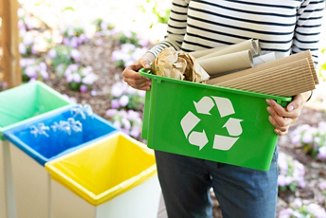Storing Fruits, Vegetables and Herbs
It’s easy to be impressed with nature’s bounty at your favorite grocery store or farmer’s market. The trouble comes when you bring your produce home and can’t seem to eat it all before it spoils, so you’ve wasted your money along with some great food. So here are some ideas to help you store and preserve your fruits, vegetables and herbs:
Fruits
- Wash all hard and smooth-skinned fruits (apples, plums, grapes) immediately. Wash fuzzy or soft-skinned fruits either right before or the night before eating. Dry your fruits thoroughly before storing.
- Do not store your fruits and vegetables together, since some fruits can prematurely ripen and spoil the surrounding produce. Remember the adage, “one bad apple can spoil the whole bunch.”
- Most fruits do not need to be stored in the refrigerator unless you are keeping them for more than a few days. An open-air basket helps fruit ripen properly at room temperature.
- Non-cherry stone fruits, avocados, tomatoes, mangoes, melons, apples and pears will continue to ripen if left sitting out, while items like citrus, grapes, berries and bell peppers will only deteriorate and should be refrigerated if not eaten quickly. Bananas in particular ripen very quickly and will also speed the ripening of any nearby fruits.
- When you refrigerate berries, they should be stored in airtight containers. Other refrigerated fruits can be kept in vented plastic bags or wrapped in loose saran wrap.
- Most new refrigerators have a fruit drawer. If you can, set the temperature to 37°F.
Vegetables
- Wash hard vegetables such as root vegetables immediately. Wash leafy greens and herbs right before using. Dry all vegetables thoroughly before storing.
- Leafy greens can be washed by soaking them in a sink full of water, while soft herbs and mushrooms should not be washed until right before they are used.
- Keep vegetables whole if you are storing them for more than a day or two. Use most vegetables within one week of storing.
- Don't store potatoes, onions, squash, eggplant, turnips or rutabagas in the refrigerator. There is too much moisture in the refrigerated environment for these vegetables.
- Remove green tops from vegetables such as carrots, beets, radishes, turnips and parsnips.
- Place vegetables in plastic storage bags or a container to prevent moisture loss. Wrap leafy greens in a couple of layers of paper towel and place them in plastic storage bags. Wrap mushrooms in paper bags.
- Pack vegetables loosely in the refrigerator. The closer they are, the quicker they will rot.
- Place vegetables in the crisper drawer of the fridge. Set the refrigerator temperature to 37°F.
Herbs
- Leafy fresh herbs should be treated just like fresh flowers. Keep them moist and let them breathe.
- Wash your leafy herbs immediately and cut ¼ inch off the bottom of the stems. Place them in a jar or other container of water and cover them with a loose produce bag or paper towel before putting them in the fridge.
- Just like flowers, drying herbs is another option.
- After washing, lay them out on paper towels to dry a little and then tie the stems together with string or rubber bands.
- Hang the upside-down bouquets in the window. They will dry out in the sunshine and look decorative in your kitchen.
- After a week, they should be dry and crisp. Store the leaves in jars until ready to use.
- Freezing is another option for you cooks. Cut up or mince your leafy herbs and put them in an ice cube tray. Add water and put them in the freezer. Toss in a few cubes when preparing your favorite dishes.
Whether you are buying your produce or growing some of your own, it’s important to know how to keep it fresh before it makes it to your table for dinner (and breakfast and lunch, too!). It’s also disheartening to see money wasted on produce that has spoiled. Hopefully these tips will help you add more fruits, vegetables and herbs to your diet as you try to live a healthier and more sustainable lifestyle.
The information presented on or through this Website is made available solely for general information purposes. We do not warrant the accuracy, completeness, or usefulness of this information. Any reliance you place on such information is strictly at your own risk. We disclaim all liability and responsibility arising from any reliance placed on such materials by you or any other visitor to this Website, or by anyone who may be informed of any of its contents. Any reference to amenities, services, rules, policies, or procedures at a Greystar apartment community is general in nature, and each Greystar apartment community may have amenities, services, rules, policies, and procedures that differ from those referenced on this Website. Please consult with your Greystar apartment community for the exact amenities, services, rules, policies, or procedures applicable.
This Website may include content provided by third parties, including materials provided by other users, bloggers, and third-party licensors, syndicators, aggregators, and/or reporting services. All statements and/or opinions expressed in these materials, and all articles and responses to questions and other content, other than the content provided by Greystar, are solely the opinions and the responsibility of the person or entity providing those materials. These materials do not necessarily reflect the opinion of Greystar. We are not responsible, or liable to you or any third party, for the content or accuracy of any materials provided by any third parties. The information contained within does not relate to Greystar Investment Group, LLC’s investment advisory business.



